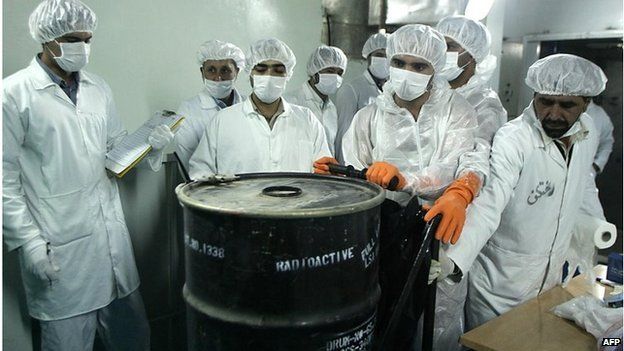US freeing Iran funds as Tehran cuts uranium stockpile
- Published

The United States is to release frozen Iranian funds, saying Tehran has kept commitments made under an interim deal over its nuclear programme.
It said $450m (£270m) would be made available in light of a report by the world's nuclear watchdog, the IAEA.
On Thursday the agency said Iran had neutralised half of its higher-enriched uranium stockpile.
The six-month deal saw Iran agree to scale back its nuclear programme in return for sanctions relief.
World powers are concerned Iran is seeking the capability to build nuclear weapons, a charge Iran strongly denies.
Talks have started on turning the temporary agreement, which came into effect in January, into a permanent one. The interim deal is due to expire on 20 July.
'Not seeking war'
Iran has diluted half of its higher-grade enriched uranium stockpile, the International Atomic Energy Agency (IAEA) said in a confidential report.
This will be seen as a positive sign by the West, as it lengthens the time Iran would need to make a nuclear bomb, says the BBC's Bethany Bell in Vienna.
Under the agreement, Iran agreed to limit its enrichment of uranium to no more than "low-level" 5%, stop enriching uranium to 20% and eliminate its stockpile of 20% enriched uranium.
The IAEA report said Iran had so far either diluted or converted nearly three-quarters of its highly-enriched stockpile.
The US state department said Washington was releasing the instalment of funds - previously frozen as punishment for Iran's nuclear programme - because "all sides have kept the commitments" they signed up to.
Iranian President Hassan Rouhani reiterated on Friday Iran's position that it had only peaceful intentions.
"During the [nuclear] talks, we announced to the world and we say so again... we are not after war, we are after logic, we are after talks," he said in a televised address marking National Army Day.
The IAEA report also said that progress in commissioning a plant for converting low-enriched uranium, part of the interim agreement, had been delayed, Reuters reported. Iran said the delay would not prevent it from fulfilling its side of the deal by the July deadline, the IAEA report noted.
The IAEA, which has inspectors in Iran, issues monthly updates on whether Iran is complying with the interim deal with the so-called P5+1 - the US, Russia, China, Britain, France and Germany.
Iran and the six powers are keen to start drafting the terms of a new deal, but correspondents say they are still some way apart.
The P5+1 wants Iran to agree to permanently reduce the scope of its enrichment programme and to give UN inspectors more oversight.
Iran's Supreme Leader, Ayatollah Ali Khamenei, has backed talks with the P5+1 but warned Tehran will never give up its nuclear programme.